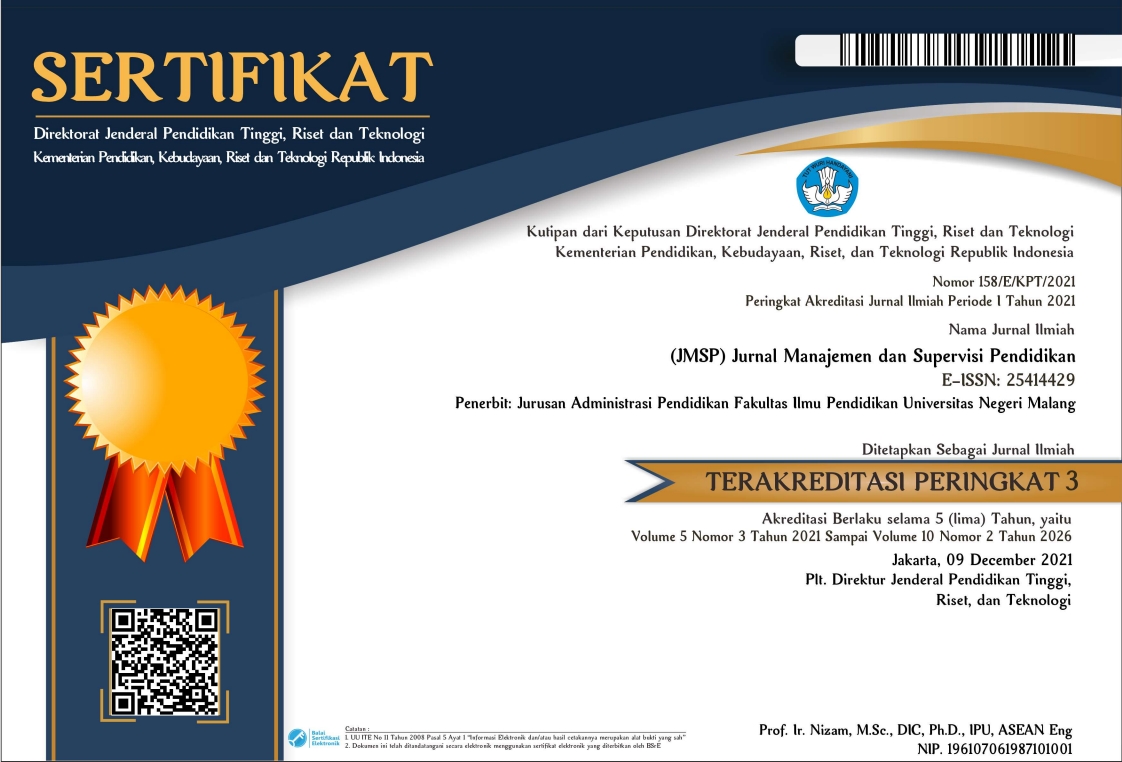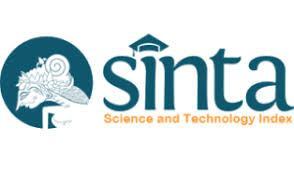Peningkatan Kinerja Guru melalui Lingkungan Kerja dengan Mengoptimalkan Efektifitas Kepemimpinan dan Komitmen Tugas
Abstract
Abstract: The purpose of this study was to determine the effect of leadership effectiveness, task commitment and work environment together on teacher performance, effect of leadership effectiveness on teacher performance, task commitment to teacher performance, work environment on teacher performance. The research method used is a survey. The sample size is 91 teachers, the sampling technique used is random cluster sampling. Data collection using a questionnaire. Data analysis consists of testing the validity and reliability of the institution, the prerequisite test for data analysis and description. Testing the hypothesis with linear regression techniques. The results of the study addressed (1) There was a significant effect of Leadership Effectiveness and Task Commitment together on Teacher Performance. (2) There is a significant effect of Leadership Effectiveness on Vocational High School Teacher Performance. (3) There is a significant effect of Task Commitment on Teacher Performance. (4) There is a significant effect of the Work Environment on Teacher Performance.
Abstrak: Tujuan dari penelitian ini adalah untuk mengetahui pengaruh efektifitas kepemimpinan, komitmen tugas dan lingkungan kerja secara bersama-sama terhadap kinerja guru, pengaruh efektifitas kepemimpinan terhadap kinerja guru, komitmen tugas terhadap kinerja guru, lingkungan kerja terhadap kinerja guru. Metode Penelitian yang digunakan adalah survey. Sampel berukuran 91 guru, teknik sampling yang digunakan yaitu random cluster sampling. Pengumpulan data menggunakan kuesioner. Analisis data terdiri dari uji validitas dan reliabilitas insturmen, uji prasyarat analisis dan deskripsi data. Pengujian hipotesis dengan teknik regresi linier. Hasil penelitian menujukan (1) Terdapat pengaruh yang signifikan Efektifitas Kepemimpinan dan Komitmen Tugas secara bersama-sama terhadap Kinerja Gur. (2) Terdapat pengaruh yang signifikan Efektifitas Kepemimpinan terhadap Kinerja Guru SMKN. (3) Terdapat pengaruh yang signifikan Komitmen Tugas terhadap Kinerja Guru. (4) Terdapat pengaruh yang signifikan Lingkungan Kerja terhadap Kinerja Guru.
Keywords
Full Text:
PDFReferences
Adib-Hajbaghery, M., & Kamrava, Z. (2019). Iranian teachers’ knowledge about first aid in the school environment. Chinese Journal of Traumatology - English Edition, 22(4), 240–245. https://doi.org/10.1016/j.cjtee.2019.02.003
Al-Mahdy, Y. F. H., Emam, M. M., & Hallinger, P. (2018). Assessing the contribution of principal instructional leadership and collective teacher efficacy to teacher commitment in Oman. Teaching and Teacher Education, 69, 191–201. https://doi.org/10.1016/j.tate.2017.10.007
Alif, A. (2015). Pengaruh Motivasi Kerja, Pengembangan Karir Dan Lingkungan Kerja Terhadap Organizational Citizenship Behavior (Ocb) Dengan Kepuasan Kerja Sebagai Variabel Intervening Pada Perusahaan Terminal Lpg. Jurnal MIX, VI(2), 291–309.
Arianto, D. A. N. (2013). Pengaruh Kedisiplinan, Lingkungan Kerja Dan Budaya Kerja Terhadap Kinerja Tenaga Pengajar. Jurnal Economia, 9(2), 191–200. https://doi.org/10.21831/economia.v9i2.1809
Asrib, A. R., & Arfandi, A. (2017). Meeting the Industrial Demand Of Construction Engineering Graduate Competence. Jurnal Pendidikan Vokasi, 7(3), 320–328.
Astuti, A. D. (2017). Pengaruh Motivasi Dan Disiplin Kerja Terhadap Kinerja Guru SD Di Kabupaten Cilacap. Jurnal Akuntabilitas Manajemen Pendidikan, 5(2), 150–160. https://doi.org/10.1017/CBO9781107415324.004
Cheasakul, U., & Varma, P. (2016). The influence of passion and empowerment on organizational citizenship behavior of teachers mediated by organizational commitment. Contaduria y Administracion, 61(3), 422–440. https://doi.org/10.1016/j.cya.2016.04.003
Cheng, A. Y. N., & Szeto, E. (2016). Teacher leadership development and principal facilitation : Novice teachers ’ perspectives. Teaching and Teacher Education, 58, 140–148. https://doi.org/10.1016/j.tate.2016.05.003
Choi, P. L., & Tang, S. Y. F. (2009). Teacher commitment trends: Cases of Hong Kong teachers from 1997 to 2007. Teaching and Teacher Education, 25(5), 767–777. https://doi.org/10.1016/j.tate.2009.01.005
Cohen, E. (2015). Principal Leadership Styles and Teacher and Principal Attitudes, Concerns and Competencies regarding Inclusion. Procedia - Social and Behavioral Sciences, 186(2002), 758–764. https://doi.org/10.1016/j.sbspro.2015.04.105
Cohen, L., Manion, L., & Morrison, K. (2007). Research Methods in Education (Sixth). New York: Routledge.
Fernet, C., Trépanier, S. G., Austin, S., & Levesque-Côté, J. (2016). Committed, inspiring, and healthy teachers: How do school environment and motivational factors facilitate optimal functioning at career start? Teaching and Teacher Education, 59, 481–491. https://doi.org/10.1016/j.tate.2016.07.019
Fitriyadi, H. (2012). Keterampilan Tik Guru Produktif SMK Di Kabupaten Hulu Sungai Utara Dan Implementasinya Dalam Pembelajaran. Jurnal Pendidikan Vokasi, 2(2), 213–233.
Foley, C., & Murphy, M. (2015). Burnout in Irish teachers: Investigating the role of individual differences, work environment and coping factors. Teaching and Teacher Education, 50, 46–55. https://doi.org/10.1016/j.tate.2015.05.001
García-García, C., Chulvi, V., Royo, M., Gual, J., & Felip, F. (2019). Does the work environment affect designers’ creativity during the creative phase depending on their personality profile? Thinking Skills and Creativity, 33(January), 100578. https://doi.org/10.1016/j.tsc.2019.100578
García Torres, D. (2019). Distributed leadership, professional collaboration, and teachers’ job satisfaction in U.S. schools. Teaching and Teacher Education, 79, 111–123. https://doi.org/10.1016/j.tate.2018.12.001
Gibson, J. L., Ivancevich, J. M., James H. Donnelly, J., & Konopaske, R. (2012). Organizations Behavior, Structure, Processes.
Gorard, S. (2004). Quantitative Methods in Social Science. https://doi.org/10.1017/CBO9781107415324.004
Hanafi, B. D., & Yohana, C. (2017). Pengaruh Motivasi, Dan Lingkungan Kerja, Terhadap Kinerja Karyawan, Dengan Kepuasan Kerja Sebagai Variabel Mediasi Pada PT BNI Lifeinsurance. Jurnal Pendidikan Ekonomi Dan Bisnis (JPEB), 5(1), 72–89.
Handaru, A. W., Utomo, T., & Sudiarditha, I. K. R. (2013). Pengaruh Lingkungan Kerja, Kompensasi Dan Komitmen Organisasi Terhadap Kepuasan Kerja Karyawan DI RS “X.” Jurnal Riset Manajemen Sains Indonesia (JRMSI), 4(1), 116–135.
Hasan, M. (2017). Pengaruh Kompetensi Profesional Guru Terhadap Kinerja Guru Ekonomi Sekolah Menengah Atas Negeri Di Kabupaten Gowa. Jurnal Economix, 5(2), 203–214.
Hasanah, D. S., Nanang Fattah, & Eka Prihatin. (2010). Pengaruh Pendidikan Latihan (DIKLAT) Kepemimpinan Guru dan Iklim Kerja Terhadap Kinerja Guru Sekolah Dasar SE Kecamatan Babakancikao Kabupaten Purwakarta. Jurnal Penelitian Pendidikan, 11(2), 90–105.
Hellriegel, D., & Slocum, J. W. (2008). Organizational Behavior (Thirteenth). Mason: South-Western.
Hermanto, S. (2016). Hubungan Kepemimpinan Kepala Sekolah terhadap Manajemen Berbasis Sekolah. Jurnal Manajemen Dan Supervisi Pendidikan, 1(1), 30–35. https://doi.org/10.17977/um025v1i12016p030
Indriaturrahmi, & Sudiyatno. (2016). Peran Dunia Usaha Dan Dunia Industri Dalam Penyelenggaraan SMK Berbasis Kearifan Lokal Di Kota Mataram. Jurnal Pendidikan Vokasi, 6(2), 162–172.
Ismail, M. I. (2010). Kinerja Dan Kompetensi Guru Dalam Pembelajaran. Lentera Pendidikan : Jurnal Ilmu Tarbiyah Dan Keguruan, 13(1), 44–63. https://doi.org/10.24252/lp.2010v13n1a4
Jo, S. H. (2014). Teacher commitment: Exploring associations with relationships and emotions. Teaching and Teacher Education, 43, 120–130. https://doi.org/10.1016/j.tate.2014.07.004
Joo, Y. H. (2020). The effects of distributed leadership on teacher professionalism: The case of Korean middle schools. International Journal of Educational Research, 99(December 2018). https://doi.org/10.1016/j.ijer.2019.101500
Kale, M., & Özdelen, E. (2014). The Analysis of Teacher Leadership Styles According to Teachers’ Perceptions in Primary Schools. Procedia - Social and Behavioral Sciences, 152, 227–232. https://doi.org/10.1016/j.sbspro.2014.09.185
Kamdi, W. (2017). Revitalisasi SMK: Mendongkrak Unggulan Nasional. Direktorat Pembinaan SMK Direktorat Jenderal Pendidikan Dasar Dan Menengah Kementerian Pendidikan Dan Kebudayaan, p. 1. Retrieved from http://psmk.kemdikbud.go.id/konten/2637/revitalisasi-smk-mendongkrak-unggulan-nasional
Kartowagiran, B. (2011). Kinerja Guru Profesional (Guru Pasca Sertifikasi). Cakrawala Pendidikan, 30(3), 463–473.
Kim, L. Y., Rose, D. E., Ganz, D. A., Giannitrapani, K. F., Yano, E. M., Rubenstein, L. V., & Stockdale, S. E. (2020). Elements of the healthy work environment associated with lower primary care nurse burnout. Nursing Outlook, 68(1), 14–25. https://doi.org/10.1016/j.outlook.2019.06.018
Kissau, S., Davin, K. J., & Wang, C. (2019). Aspiring world language teachers: Their influences, perceptions, and commitment to teaching. Teaching and Teacher Education, 78, 174–182. https://doi.org/10.1016/j.tate.2018.11.020
Klassen, R. M., & Chiu, M. M. (2011). The occupational commitment and intention to quit of practicing and pre-service teachers: Influence of self-efficacy, job stress, and teaching context. Contemporary Educational Psychology, 36(2), 114–129. https://doi.org/10.1016/j.cedpsych.2011.01.002
Luthans, F. (2011). Organizational Behavior An Evidence-Based Approach. In McGraw-Hill/Irwin (12th ed.). New York: The McGraw-Hill Companies, Inc.
Luyten, H., & Bazo, M. (2019). Studies in Educational Evaluation Transformational leadership, professional learning communities, teacher learning and learner centred teaching practices; Evidence on their interrelations in Mozambican primary education. Studies in Educational Evaluation, 60(November 2018), 14–31. https://doi.org/10.1016/j.stueduc.2018.11.002
McInerney, D. M., Ganotice, F. A., King, R. B., Marsh, H. W., & Morin, A. J. S. (2015). Exploring commitment and turnover intentions among teachers: What we can learn from Hong Kong teachers. Teaching and Teacher Education, 52, 11–23. https://doi.org/10.1016/j.tate.2015.08.004
Meyer, J. P., Morin, A. J. S., Stanley, L. J., & Maltin, E. R. (2019). Teachers’ dual commitment to the organization and occupation: A person-centered investigation. Teaching and Teacher Education, 77, 100–111. https://doi.org/10.1016/j.tate.2018.09.009
Mohammadtaheri, N. (2011). The study of effective factors on the teachers’ work commitment in High Schools. Procedia - Social and Behavioral Sciences, 29(Iceepsy), 1524–1530. https://doi.org/10.1016/j.sbspro.2011.11.393
Naydenova, I. S., & Naydenova, N. N. (2016). Teacher’s Electronic Portfolio in Professional Standard of Teacher. SHS Web of Conferences, 29(01052), 1–5. https://doi.org/10.1051/shsconf/20162901052
Ngang, T. K. (2012). A comparative study on teacher leadership in special education classroom between China and Malaysia. Procedia - Social and Behavioral Sciences, 31(2011), 231–235. https://doi.org/10.1016/j.sbspro.2011.12.047
Ngang, T. K., & Abdullah, N. A. C. (2015). Teacher Leadership and Classroom Management Practice on Special Education with Learning Disability. Procedia - Social and Behavioral Sciences, 205(May), 2–7. https://doi.org/10.1016/j.sbspro.2015.09.003
Nousiainen, T., Kangas, M., Rikala, J., & Vesisenaho, M. (2018). Teacher competencies in game-based pedagogy. Teaching and Teacher Education, 74, 85–97. https://doi.org/10.1016/j.tate.2018.04.012
Nurhayati, D., Minarsih, M. M., & Wulan, H. S. (2016). Pengaruh Kepuasan Kerja, Lingkungan Kerja Dan Loyalitas Kerja Tehadap Organizational Citizenship Behavior (OCB) ( Studi Kasus Pada PT. Perwirabhakti Sentrasejahtera Di Kota Semarang). Journal of Management, 2(2), 1–24.
Petrovska, S., & Sivevska, D. (2014). How Macedonian Educational Context Supports Leadership Role of Elementary School Teachers. Procedia - Social and Behavioral Sciences, 116, 4098–4102. https://doi.org/10.1016/j.sbspro.2014.01.897
Prasetyono, H., Abdillah, A., & Fitria, D. (2018). Academic Supervision toward Teacher ’ s Performance through Motivation as Intervening Variable. Journal of Education and Learning (EduLearn), 12(2), 188–197. https://doi.org/10.11591/edulearn.v12i2.7324
Prasetyono, H., Abdillah, A., Widiarto, T., & Sriyono, H. (2018). Character-Based Economic Learning Implementation And Teacher’s Reinforcement On Student’s Affective Competence In Minimizing Hoax. Jurnal Cakrawala Pendidikan, 37(3), 426–435.
Prilop, C. N., Weber, K. E., & Kleinknecht, M. (2019). How digital reflection and feedback environments contribute to pre-service teachers’ beliefs during a teaching practicum. Studies in Educational Evaluation, 62(February), 158–170. https://doi.org/10.1016/j.stueduc.2019.06.005
Purwanto, N. (2004). Prinsip-Prinsip dan Teknik Evaluasi Pengajaran. Bandung : Rosdakarya
Purwoko, S. (2018). Pengaruh Kepemimpinan Kepala Sekolah, Komitmen Guru, Disiplin Kerja Guru, Dan Budaya Sekolah Terhadap Kinerja Guru SMK. Jurnal Akuntabilitas Manajemen Pendidikan, 6(2), 149–162. https://doi.org/10.1017/CBO9781107415324.004
Putro, A. R. T. S., & Triyono, M. B. (2016). Pengelolaan Labkom Di Sekolah Menengah Kejuruan. Jurnal Pendidikan Vokasi, 6(2), 143–153.
Riani, N. L. T., & Putra, M. S. (2017). Pengaruh Stres Kerja, Beban Kerja Dan Lingkungan Kerja Non Fisik Terhadap Turnover Intention Karyawan. E-Jurnal Manajemen Unud, 6(11), 5970–5998.
Rytivaara, A., Pulkkinen, J., & de Bruin, C. L. (2019). Committing, engaging and negotiating: Teachers’ stories about creating shared spaces for co-teaching. Teaching and Teacher Education, 83, 225–235. https://doi.org/10.1016/j.tate.2019.04.013
Salam, A. A., & Kewo, C. L. (2017). Servant Leadership: Model Kepemimpinan Kontemporer Kepala Sekolah. Jurnal Manajemen Dan Supervisi Pendidikan, 2(1), 75–82. https://doi.org/10.17977/um025v2i12017p075
Saputra, I., & Sudharma, I. (2017). Pengaruh Promosi Jabatan, Pelatihan Dan Lingkungan Kerja Terhadap Kepuasan Kerja Karyawan. E-Jurnal Manajemen Universitas Udayana, 6(2), 1030–1054.
Shah, M., & Abualrob, M. M. A. (2012). Teacher Collegiality and Teacher Professional Commitment in Public Secondary Schools in Islamabad, Pakistan. Procedia - Social and Behavioral Sciences, 46, 950–954. https://doi.org/10.1016/j.sbspro.2012.05.229
Sinha, S., & Hanuscin, D. L. (2017). Development of teacher leadership identity : A multiple case study. Teaching and Teacher Education, 63, 356–371. https://doi.org/10.1016/j.tate.2017.01.004
Sirisookslip, S., Ariratana, W., & Ngang, T. K. (2015). The Impact of Leadership Styles of School Administrators on Affecting Teacher Effectiveness. Procedia - Social and Behavioral Sciences, 186, 1031–1037. https://doi.org/10.1016/j.sbspro.2015.04.022
Smantser, A., & Ignatovitch, E. (2015). Future Teacher Training for Work in Inclusive Educational Environment: Experimental Study Results. Procedia - Social and Behavioral Sciences, 214(June), 422–429. https://doi.org/10.1016/j.sbspro.2015.11.699
Sofyan, D. K. (2013). Pengaruh Lingkungan Kerja Terhadap Kinerja Kerja Pegawai BAPPEDA. Malikussaleh Industrial Engineering, 2(1), 18–23.
Sugiyono. (2012). Statistika dalam Penelitian. Bandung: Alfabeta
Susilo, T. (2013). Analisis Pengaruh Faktor Lingkungan Fisik Dan Non Fisik Terhadap Stress Kerja Pada PT. Indo Bali Di Kecamatan Negara Kabupaten Jimbaran Bali. Journal of Chemical Information and Modeling, 53(9), 1689–1699. https://doi.org/10.1017/CBO9781107415324.004
Sutrisno, V. L. P., & Siswanto, B. T. (2016). Faktor-Faktor Yang Mempengaruhi Hasil Belajar Siswa Pada Pembelajaran Praktik Kelistrikan Otomotif SMK Di Kota Yogyakarta. Jurnal Pendidikan Vokasi, 6(1), 111–120.
Suwondo, D. I., & Sutanto, E. M. (2015). Hubungan Lingkungan Kerja, Disiplin Kerja, Dan Kinerja Karyawan. Jurnal Manajemen Dan Kewirausahaan, 17(2), 135–144. https://doi.org/10.9744/jmk.17.2.135
Tharenou, P., Donohue, R., & Cooper, B. (2007). Management Research Methods. Cambridge: Cambridge University Press.
Toom, A., Pietarinen, J., Soini, T., & Pyhältö, K. (2017). How does the learning environment in teacher education cultivate first year student teachers’ sense of professional agency in the professional community? Teaching and Teacher Education, 63, 126–136. https://doi.org/10.1016/j.tate.2016.12.013
White, E. M., Aiken, L. H., Sloane, D. M., & McHugh, M. D. (2020). Nursing home work environment, care quality, registered nurse burnout and job dissatisfaction. Geriatric Nursing, 41(2), 158–164. https://doi.org/10.1016/j.gerinurse.2019.08.007
Yucel, I., & Bektas, C. (2012). Job Satisfaction, Organizational Commitment and Demographic Characteristics Among Teachers in Turkey: Younger is Better? Procedia - Social and Behavioral Sciences, 46, 1598–1608. https://doi.org/10.1016/j.sbspro.2012.05.346
Yukl, G., (2001). Leadership in Organizations, Fifth Edition. New Jersey: Printice-Hall, Inc
Zuhry, A. W & Sugiyarti, G. (2018). Pengaruh Gaya Kepemimpinan, Pendidikan dan Pelathan struktural, dan komitmen organisasi terhadap kompetensi peserta. Jurnal Manajemen Dan Supervisi Pendidikan, 3(1), 1–11.
DOI: http://dx.doi.org/10.17977/um025v4i32020p255
Refbacks
- There are currently no refbacks.
Copyright (c) 2020 JMSP (Jurnal Manajemen dan Supervisi Pendidikan)

This work is licensed under a Creative Commons Attribution 4.0 International License.









